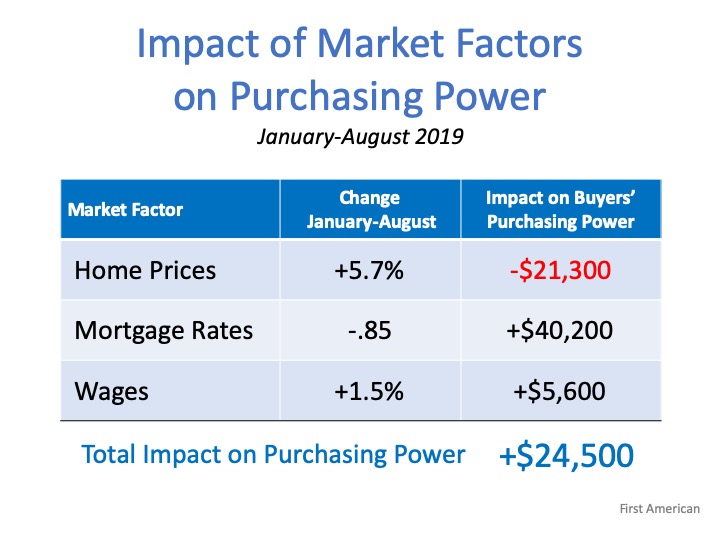
“Price is not the only market factor that impacts affordability.”
Home buying activity (demand) is up, and the number of available listings (supply) is down. When demand outpaces supply, prices appreciate. That’s why firms are beginning to increase their projections for home price appreciation going forward. As an example, CoreLogic increased their 12-month projection for home values from 4.5% to 5.6% over the last few months.
The reacceleration of home values will cause some to again voice concerns about affordability. Just last week, however, First American came out with a data analysis that explains how price is not the only market factor that impacts affordability. They studied prices, mortgage rates, and wages from January through August of this year. Here are their findings:
Home Prices
“In January 2019, a family with the median household income in the U.S. could afford to buy a $373,900 house. By August, that home had appreciated to $395,000, an increase of $21,100.”
Mortgage Interest Rates
“The 0.85 percentage point drop in mortgage rates from January 2019 through August 2019 increased affordability by 9.7%. That translates to a $40,200 improvement in house-buying power in just eight months.”
Wage Growth
“As rates have fallen in 2019, the economy has continued to perform well also, resulting in a tight labor market and wage growth. Wage growth pushes household incomes upward, which were 1.5% higher in August compared with January. The growth in household income increased consumer house-buying power by 1.5%, pushing house-buying power up an additional $5,600.”
When all three market factors are combined, purchasing power increased by $24,500, thus making home buying more affordable, not less affordable. Here is a table that simply shows the data:
Bottom Line
In the article, Mark Fleming, Chief Economist at First American, explained it best:
“Focusing on nominal house price changes alone as an indication of changing affordability, or even the relationship between nominal house price growth and income growth, overlooks what matters more to potential buyers – surging house-buying power driven by the dynamic duo of mortgage rates and income growth. And, we all know from experience, you buy what you can afford to pay per month.”
To view original article, visit Keeping Current Matters.
Thinking About Using Your 401(k) To Buy a Home?
Before you decide to dip into your retirement to buy a home, be sure to consider all possible alternatives and talk with a financial expert.
Homeowner Net Worth Has Skyrocketed
Buying a home can be a great way to grow your net worth, since home values have a tendency to rise over time, meaning you have more equity.
Reasons To Sell Your House Before the New Year
Selling now, while other homeowners may hold off until after the holidays, can help you get a leg up on your competition.
Don’t Believe Everything You Read About Home Prices
If you believe home prices are falling, it may be time to get your insights from the experts, and they’re saying prices are climbing.
Foreclosures and Bankruptcies Won’t Crash the Housing Market
Foreclosure filings are inching back up to pre-pandemic numbers, BUT they’re still way lower than when the housing market crashed in 2008.
Affordable Homeownership Strategies for Gen Z
One of your best resources on the journey as a young homebuyer is a trusted real estate agent.







.jpg )



